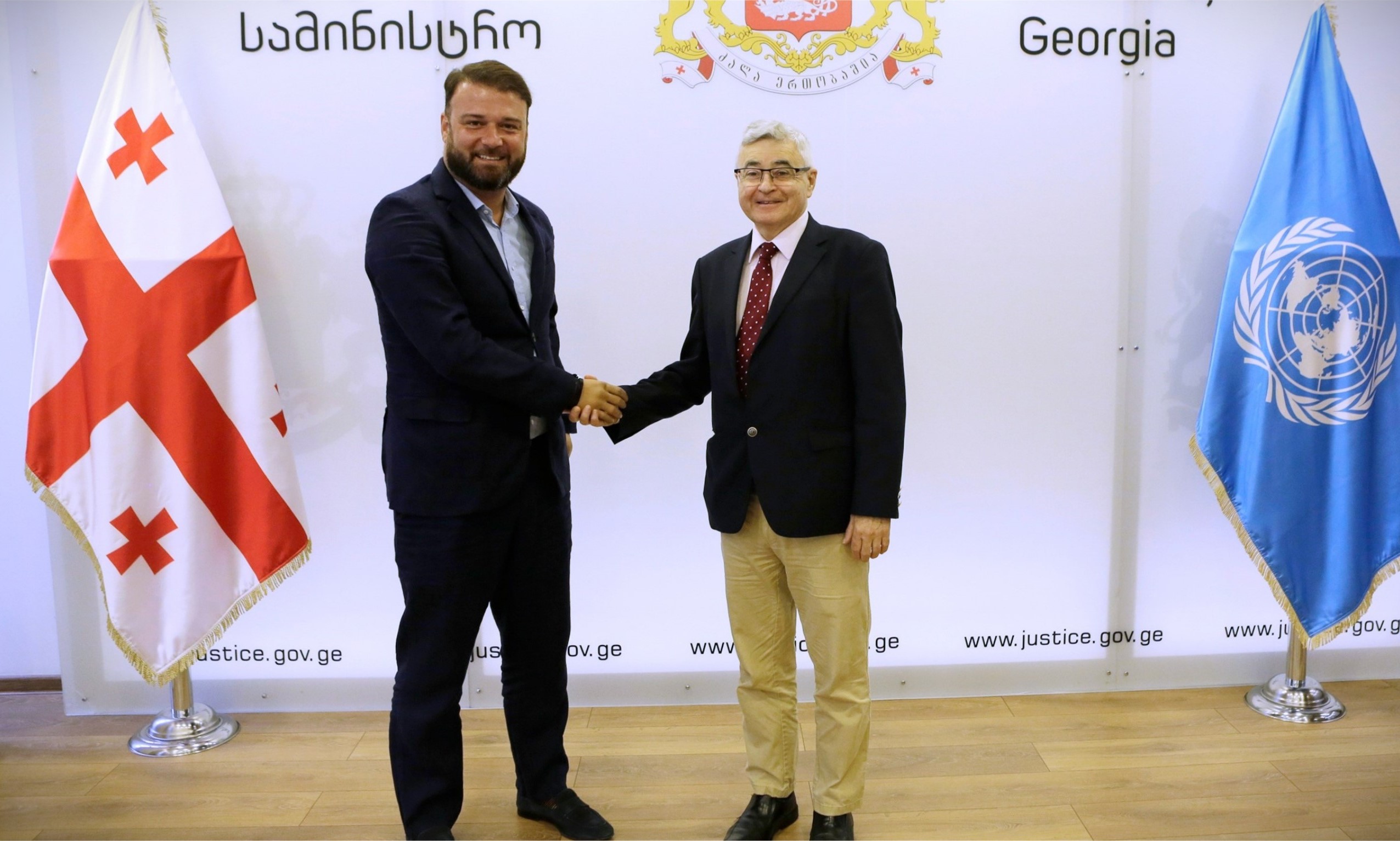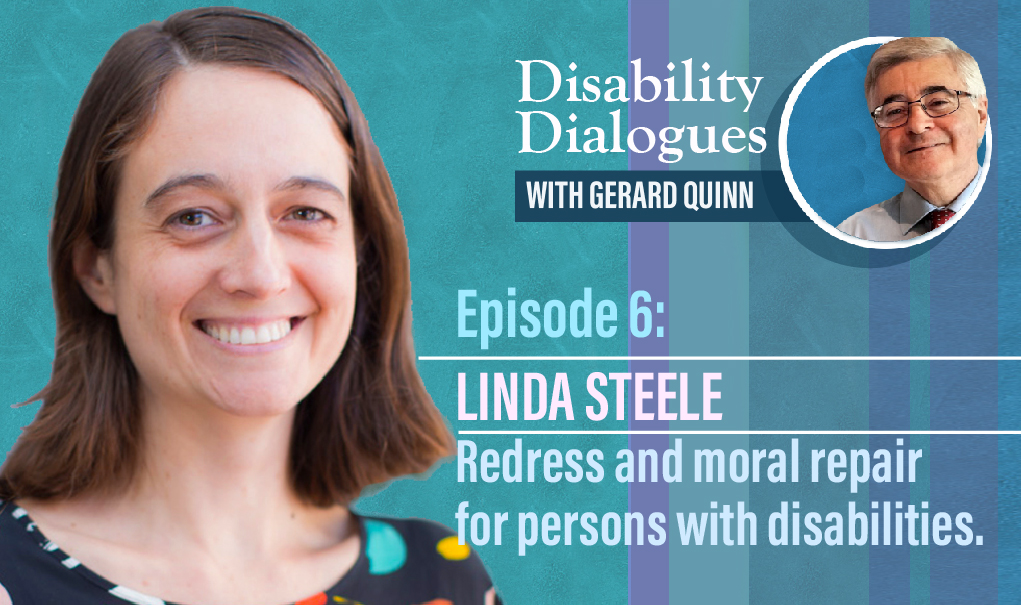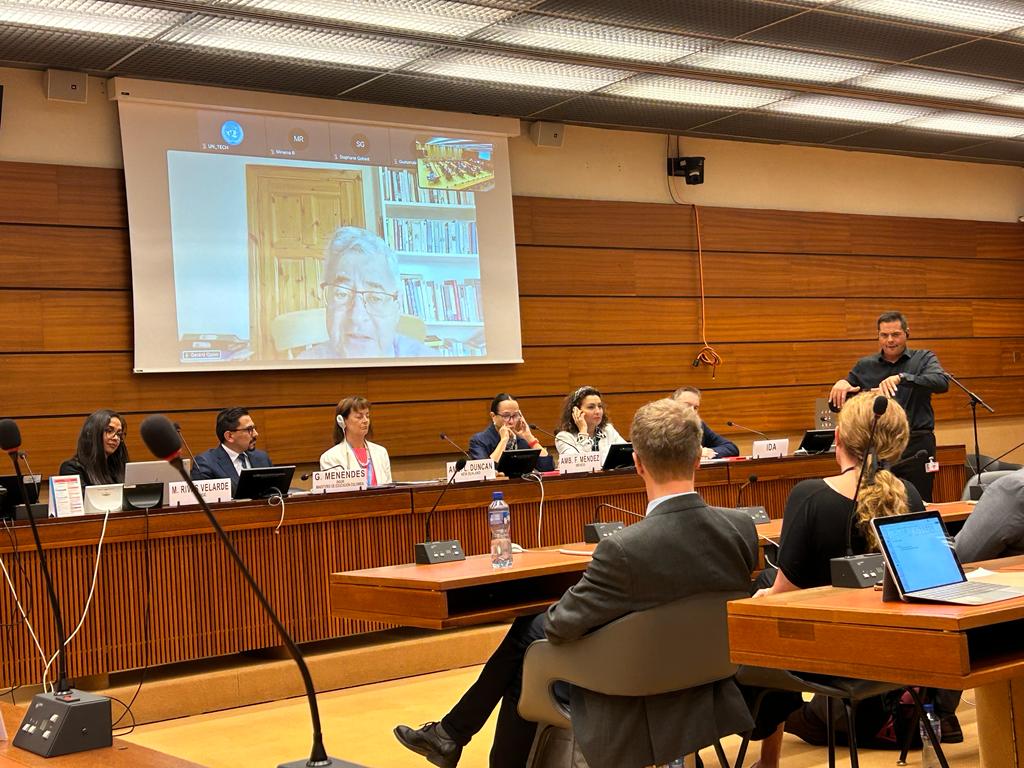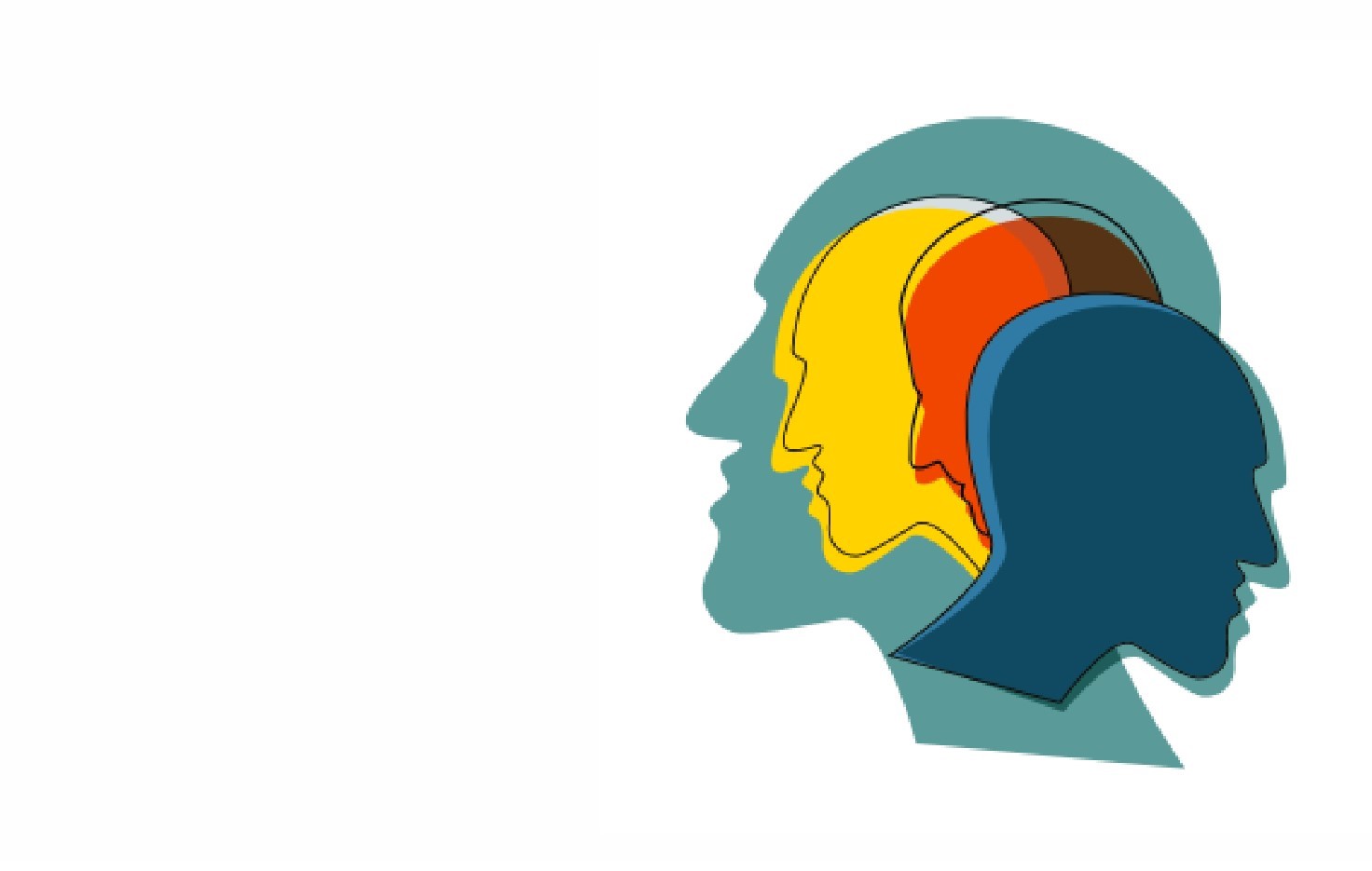End of Mission Statement by Gerard Quinn, on his visit to Georgia.
(Geneva, 14 September) - During the past two weeks I have had the opportunity to see for myself the many steps taken to ensure the full enjoyment of the rights of persons with disabilities in Georgia. I have had many open and constructive conversations about the challenges that remain.
I am most thankful to the Government of Georgia for the invitation to visit the country and I extend my heartfelt thanks to all of those who made my visit possible.
I equally want to express gratitude to the United Nations Resident Coordinator and the United Nations Country Team, including different United Nations agencies, for their strong support prior to and during the visit.
Most importantly, I also would like to acknowledge and thank all the persons with disabilities and their representative organizations with whom I met. They shared with me their hopes and dreams for the future. They exhibited great strength, creativity, tenacity, and resilience, particularly the youth and women with disabilities, in advocating for and advancing their rights. I found their stories immensely powerful and highly instructive.
During my visit, I had discussions with senior officials representing a variety of ministries, governmental agencies, and municipalities. I also met with parliamentarians and participated in a meeting of the Human Rights and Civil Integration Committee of the Parliament of Georgia. I would also like to thank the Public Defender (Ombudsman) of Georgia, the international donor community, the private enterprises who shared their endeavors and all others who shared their vision for change.
I regret I could not access the regions of Abkhazia and Tskhinvali region/South Ossetia to assess the rights of persons with disabilities there especially as these populations are at a heightened risk of being left behind, particularly older persons with disabilities. I made it a point of principle to try.
Georgia is making great strides to move away from a medicalized model of disability that locates the problem within the person to the biopsychosocial model that locates the problem in how society responds to the human difference of disability. This represents a profound cultural shift. It helps re-set cultural norms and expectations - even within persons with disabilities themselves. It acts as a rust solvent to clear away stigma. And it leads to a completely new agenda - removing the legacy of the past and creating a much more inclusive Georgia of tomorrow. This new framing of inclusion touches nearly every policy sphere - education, employment, health care to name a few. It not only affects how social policy is re-set but also how economic policy is re-imagined.
Not only is inclusion the right policy to pursue but it is also efficient. All benefit from the release of native talent and all persons with disabilities can be active and productive citizens. And the move toward inclusion means that service models developed many decades ago need to be wholly transformed. This is not unique to Georgia but is acute in Georgia.
Reflecting this gradual movement away from the medical model, Georgia ratified the United Nations Convention on the rights of persons with disabilities (CRPD) in 2014 and the Protocol thereto in 2021. It has adopted a 2020 Law on the rights of persons with disabilities and it plans to ratify the Marrakesh Treaty to Facilitate Access to Published Works for Persons Who Are Blind, Visually Impaired or Otherwise Print Disabled. This will release many published works and make them available to blind users and students. This is a very welcome development.
I have often insisted that countries should not do the right thing just because treaties tell them to. They have to do it because they want to do it. Much of the change comes down to the profound paradigm shift underway in Georgia of values. I was struck by the genuine buy-in and understanding of all stakeholders, including governmental officials, of the core values at stake and, consequently, of the reforms needed to foster and sustain change.
While Georgia, like any State party to the CRPD, bears primary responsibility to chart a meaningful and impactful line of change for Georgians with disabilities, third parties such as donors bear responsibility to ensure their programmes are inclusive of persons with disabilities. In my interactions with many donors, I was heartened to see a great commitment to support the paradigm shift in many policy domains.
What follows are some of my impressions and reflections on the process of change being undertaken in Georgia and on some key challenges.
Building blocks for change
The adoption of the Law of Georgia on the Rights of Persons with Disabilities in 2020 is a great step forward and a pioneering piece of legislation.
The new framing of inclusion is touching nearly every policy sphere – education, employment, health care to name a few.
A key aspect of the 2020 legislation is the prohibition against discrimination on the basis of disability which includes the denial of 'reasonable accommodation.' I suggest the concept of 'reasonable accommodation' can and should be a great driver of change especially in contexts of resource scarcity. I would respectfully suggest that this core obligation needs to be further elaborated and communicated to all affected parties – both in the public sector and in the private sector.
I was struck by the insertion of disability rights into the National Human Rights Strategy. This embeds disability as a core human rights issue. It also connects disability to other human rights fields such as business & human rights which is key to how the service economy is re-shaped. I would suggest that the relevant action plan(s) to be elaborated under the overall strategy should be tangible and detailed enough to effectively implement the CRPD.
The establishment of an Inter-Agency Coordination Mechanism for the Law on the rights of persons with disabilities in 2022, is also a key step forward. Joined up thinking and joined up Government in active consultation with civil society is key to coherent progress. I would suggest this mechanism – which is key to embedding the paradigm shift away from the medical model – deserves more tangible support from Government. A timely investment now in terms of resources, including expertise, would pay handsome dividends.
I commend the role and well-established track record of the Public Defender’s Office as the monitoring body for the CRPD implementation.
I am profoundly impressed by the commitment, knowledge, and activism of persons with disabilities, their representative organizations and civil society in Georgia. They are vocal advocates and effective watchdogs for the rights of persons with disabilities. They actively want to contribute to the building of Georgia and take great pride in their country's successes.
I note that the 2020 Law proposes to support such organizations and would suggest that the time is right to do so. Properly supported, they - especially at the grass roots - bring the raw edge of experience to the table and are an invaluable asset in the formulation of rational policy. This is borne out by the fact that most ministries now have consultative councils with persons with disabilities. To make this work – to sustain a positive cycle of change – they deserve more systematic support.
The plurality and diversity of voices is a sign of a healthy civic space. I suggest great care has to be taken to reach out to lesser heard voices and to ensure that hidden perspectives are allowed the light of day.
A vital precondition for rational policy making in all domains is data collection as is made clear in Article 31 of the CRPD. The current data on disability is based on numbers of beneficiaries of the disability social package and suggests a population of persons with disabilities in Georgia is between 3 and 4 per cent of the total population. This appears too low given that the World Health Organization estimates at least 15 per cent disability prevalence globally. The move away from the medical model should correct for this to some extent. The future of data has not so much to do with prevalence as it has to do with charting the obstacles faced by persons with disabilities.
Selected Key Policy Domains and Challenges
Inclusion is not an abstract idea. It is made real in many domains of crucial importance to all humans. The following are my observations on selected areas which will be further expanded and complemented in the detailed report on the visit.
Legal Capacity
The paradigm shift away from the medical model entails centering persons with disabilities in their own lives – making life decisions for themselves. That is why the issue of legal capacity is so central, both symbolically and practically.
The 2015 reform in Georgia demonstrates positive movement towards supported decision-making based on their needs and capacity rather than on a medical diagnosis. I suggest further reforms are needed. For one thing, the concept of 'supported decision-making' is insufficiently developed or articulated in Georgia. It is not about guiding or directing a person. It is about a process of revealing a person's wishes and preferences – and respecting them. I would suggest much more detailed guidance on what 'supported decision-making' is - and what it is not.
For another, the CRPD propounds a theory of universal legal capacity to be enjoyed by all persons with disabilities regardless of the difference of disability. That being said, the only objective of 'assessment' is to assess which kinds of supports are appropriate. The choice always remains with the person. However, it appears that assessments in Georgia either directly or indirectly lead to determinations of legal incapacity – surely not what the reform promised. Reforms are needed to eliminate this in order to better comply with Article 12 of the CRPD and achieve the aim of the reforms.
The recent Concluding observations of the CRPD Committee specifically criticized Georgia for a provision in the Criminal Procedure Code that summarily dismissed the testimony of a person with a disability if they had previously been institutionalized. I was told that courts are now encouraged to weigh the evidence for themselves. I nevertheless suggest that the relevant provisions be removed from the code.
More generally I was told that the practice of forensic assessment is still utilized to determine whether an individual has the capacity to serve as a witness or bring a complaint as a victim. The process of forensic assessment was highlighted by the disability community and their advocates as humiliating and traumatizing. An instance was shared with me of a woman with a disability who was the victim of a rape that was asked to answer math questions to determine her capability to perceive and thus be a reliable witness. It is impossible to square this practice with the UN disability treaty and it perhaps represents a legacy of the medical model. If Georgia is sincere about the move away from the medical model - and I have no doubt it is - then this needs wholesale reform.
While many challenges remain, I am cautiously optimistic that positive change can happen to respect the autonomy and legal capacity of people with disabilities. This is because such practices as forensic examination clearly belong to the past of the medical model which Georgia is trying hard to get rid of. This presents a golden opportunity to introduce new reforms – in consultation with persons with disabilities – to respect autonomy. This time with adequate guidance, monitoring and support.
Independent living and the process of deinstitutionalization
Getting a life starts with a home of one's own – no matter how modest. I sincerely welcome the government’s focus on deinstitutionalization which should ultimately lead to all people with disabilities living and accessing services and support- including rehabilitation - directly in their own communities. A deinstitutionalization strategy was adopted by the Government in 2023. But the process started well before with the move to close larger boarding institutions for persons with disabilities.
During my visit, I travelled to a residential institution for persons with disabilities in Dusheti. While conditions there are improving, it was painfully clear that many residents could in fact thrive in their own communities if only provided some of the core services. To its credit, the institution itself supported the movement of residents to smaller ‘family type homes’ which is gratifying. Some of the persons with disabilities living in such houses told me about the positive changes in their lives, for example being able to start working and learning new skills. But this cannot be a long-term solution. For one thing, congregated living reinforces negative perceptions in the community. I suggest that the core policy objective must be the development of community and home-based services that will support persons with disabilities to live independently.
Day care centers remain few and far apart. I was impressed by the one I visited in Saguramo. Their primary goal should be as connectors with the community. In this way they can play their part in the paradigm shift away from the medical model. They are part of a broader ecosystem.
The Government plans to introduce a personal assistance program under the 2020 Law. The Government adopted related policy documents and the project is being piloted in five municipalities. This is exactly a new kind of service that could prove transformative and I encourage the Government to now prioritize labor force development and appropriate funding for a rational roll-out throughout the country.
Development of support services is set against the background of decentralization whereas municipalities will assume more and more responsibilities in the sphere, including personal assistance. Again, the direction is positive but requires assurances that municipalities will be provided sufficient funding, guidance, oversight mechanisms and capacity-building. While they already informally exchange their experiences, perhaps a way could be found for networks of municipalities to more systematically share perspectives in achieving inclusion and accessing international know-how.
Many people with disabilities are not informed and therefore do not benefit from available disability allowances and other services. This is especially pronounced in more remote rural areas and affects those from ethnic minorities. Due to stigma and misconceptions, some families are not in favour of their children receiving the disability status. Here, the role of community based and run organizations that share information and assist in identifying needs and supports is vital. This was abundantly clear after my meeting with representatives from the independent living centres in Telavi and Lagodekhi. This is why the promise by the Government to support community-based organizations is so important.
Finally, families – especially women – carry a significant part of care and support for persons with disabilities on their shoulders. Any service paradigm change needs to take carers into account in addition to persons with disabilities they are caring for. Family support is not an add- on, it is essential.
Inclusive Education
The future of any country, Georgia included, means embracing education as the key to unlocking human potential. Georgia has undertaken important steps towards inclusive education for persons with disabilities.
Georgia sought to make pre-school through secondary level education accessible by providing assessments of the needs of children with disabilities. I saw at first hand how well this can work by visiting Public School no 9. in Tbilisi. I am unclear whether inclusive education embraces children who have visual and hearing impairments. More remains to be done to ensure access to quality and inclusive education as funding, individual special needs assistance, support for students with disabilities, specialized training of qualified teachers, overcoming societal stigmas – especially for girls with disabilities. I am optimistic that positive change can continue, particularly through the adoption of draft amendments of the Law of General Education in support of the inclusive education support system which are awaiting adoption by the Parliament.
A major gap is the third level education. Youth with disabilities regularly highlighted both physical and informational barriers preventing them from seeking higher education. For example, a young woman with a disability from an internally displaced family noted the facilities at her university were not accessible to enable her to reside on campus. This meant that everyday her family must drive her to and from Tbilisi to attend classes, placing unnecessary strain. She is the future but her future is unnecessarily made hard.
Other countries have greatly benefited from undertaking a comprehensive assessment of the accessibility of higher education and vocational training for persons with disabilities. I suggest a similar assessment here would help pave the way for a detailed strategy for advancing both accessibility in higher education and also for ensuring that higher education itself is addressing the needs of Georgian with disabilities, whether in training teachers in inclusive education, equipping support persons to provide quality services like personal assistance or sign language interpretation, or developing technology and course materials that are accessible.
Accessibility
Persons with disabilities consistently highlighted barriers to access the physical, informational and digital environment.
Priority needs to be given to the effective enforcement of the National Accessibility Standards adopted in 2020 and the drafting of the promised plan to retrofit older buildings in line with existing national legal requirements. I was informed of plans to effectively transpose EU Directives on web accessibility. This would fill a major gap and be a great step forward.
Positively, the National Accessibility Standards are based on universal design principles and apply to new buildings constructed both by the private and public sectors. Key to realizing the full effect of these standards is strong implementation and enforcement mechanisms an aspect which requires to be strengthened. Persons with disabilities recurrently told me about instances where physical accessibility measures taken (e.g. building of a ramp, textured tiles, and crosswalk audio cues) ended up being either unusable, incomplete, or incorrectly calibrated. Another key concern is the inaccessibility of the electronic form to file complaints with courts for persons with visual impairments.
While much attention – rightly – has been given to ensuring (physical) accessibility, there has not been sufficient effort given to focus on the complementary obligation of 'reasonable accommodation.' If it is objectively impossible to retrofit a building then, pending its refurbishment, a way should be found to render the services it houses to be nevertheless accessible. This is done in some municipalities already. Why not systematize it across the country.
Any plan to retrofit older buildings will need to set priorities and a clear timeline - in active consultation with the community.
Mental Health
Important changes on mental health and human rights are underway at the global level and Georgia is making efforts to align some of its mental health policies and practices with human rights standards. A new Mental Health Strategy for 2022 until 2030 and a three-year long action plan are in place.
That said, important challenges remain and stigma against people with psychosocial disabilities seems particularly entrenched. People with psychosocial disabilities are often placed and remain in specialized psychiatric institutions for prolonged periods of time due to insufficient outpatient and community-based mental health services as well as lack of housing and rejection from families and communities. Moreover, there are serious concerns over the extremely poor conditions in psychiatric institutions which are overcrowded.
I was surprised to learn about the very high rate of voluntary admissions in psychiatric institutions. I am unclear as to how many of these voluntary patients were indeed there voluntarily or under what circumstances was their permission obtained. I was alarmed to hear some anecdotes about allegations of threats, coercion and manipulation exerted on patients to sign documents for voluntary admission. Further study seems warranted.
I was told that in some cases where the legality of involuntary placement and treatment are contested in courts, the complainants risk being denied mental health services in the future. In one example brought to my attention, a woman who used her right to legally challenge her placement in a psychiatric institution was denied hospitalization at another time when she needed it because the hospital was afraid to be sued. Once again, the overall policy direction seems progressive but the service paradigm to make implementation realistic and sustainable is lacking. I was informed that more than half of the public budget for mental health is allocated to psychiatric institutions. Allocation of resources to services to support individuals and their families to leave these institutions and reenter society will go a long way.
I was encouraged, nonetheless, by initiatives being taken, such as mobile mental health teams, that deserve further development, including in terms of standards and regulations to address mental health needs more properly. I was encouraged by the professionals in the field who themselves are motivated to move to a different model and are well aware of best international practice. The overall strategy is in place - it needs to be delivered.
Conclusions
Georgia has positioned itself to advance the rights of persons with disabilities by validating the move from the medical model to a much more social model based on human rights and inclusion. This is a profound cultural shift and deserves support.
It has ratified the relevant international standards and is open and keen to learn about best practice around the world.
It has adopted a promising human rights strategy and has symbolically placed disability at the heart of that strategy. Much will depend on the relevant action plans which could serve as a way of giving effect to the CRPD.
It has adopted a promising piece of headline legislation. It deserves further detailed elaboration especially on pivotally important concepts such as 'reasonable accommodation.'
It has a vibrant civil society which already provides critical insights in enabling rational policy to evolve. The Government has pledged support to representative organizations of persons with disabilities and this would be a wise investment to ensure a positive cycle of change based on lived experience.
Many challenges remain - in domains such as independent living, legal capacity, criminal process and third level education. And the coordination mechanism that is key to rational reform, needs and deserves strengthening.
International donors can help sustain the process of change.
Leaving no one behind means ensuring that persons with disabilities are fully engaged in all aspects of Georgian society, that they are living in the community and not in institutions, that they are in schools and workplaces and cultural centers, not isolated in their homes. The ability to clearly see the challenges and gaps by the Government of Georgia speaks volumes to the potential of the country to achieve their goal of an inclusive society. This transition point for Georgia is crucial and while much work remains, I am cautiously confident that through continued engagement with the disability community, willingness from the government, and active support of international donors, Georgia will make meaningful progress to becoming a more inclusive society and economy - one where all belong.






